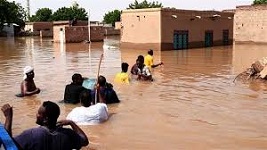BY ANDUALEM SISAY GESSESSE – I heard the shocking news over this weekend about the flash flooding in the neighboring Sudan’s capital Khartoum. Some 80 people have died while thousands of houses hare demolished by the flooding that followed the heavy rain in the Ethiopian Highlands. The sad news came a day after the African Union led negations among Ethiopia, Sudan and Egypt on Ethiopia’s mega dam on Abbay River has failed to result in mutual beneficial agreement for the three countries.
Labeled the Great Ethiopian Renaissance Dam (GERD), which has the capacity to hold 74 billion cubic meters of water from Abbay River, which comes from Ethiopian Highlands and travels over 6,000 kilometers all the way through Sudan and Egypt before it concludes its long journey in the Mediterranean Sea.
Ethiopia’s mega dam from the very beginning of its construction a few dozen kilometers away from the Sudan-Ethiopian border, has been subject to critic by the Egyptian government and sometimes by the some Sudanese politicians. The two downstream countries (Sudan and Egypt) of the Abbay River, which becomes the Blue Nile in Kahartoum, claimed that GERD will reduce the volume of water their farmers and mega hydro projects, among others used to get from the river.
Ethiopia on the other hand bags been arguing that it needs to provide renewable energy to more than its half population (over 50 million) and support their effort to lift themselves out of extreme poverty using the water of Abbay River, which contributes around 86% of the water flowing to the Nile.
In addition, Ethiopia has been stressing that having such a mega dam in the areas where it is being built will enable Khartoum to get well regulated water and avoid the kind of today’s catastrophic flooding, which Sudan has been suffer from for many decades.
It is in the middle of this disagreement that Ethiopia managed to fill GERD with close to 5 billion cubic meters of water, which upset both Sudan and Egypt and some donors (the United States and World Bank), who were observers of the talks and finally turned themselves into mediators.
Somehow the government of Sudan seems to acknowledge that GERD has benefits as long as its construction is safe and up to the standard. Meanwhile recently the Khartoum Government seems to fall under the pressure of Egypt, which is backed by President Trump’s administration of the United States, which reportedly is set to hold some of its aid to Ethiopia because the east African country refused U.S. mediation in the talk of the GERD.
My question today for some of my Sudanese confused politicians and elites as well as the United States is, Had Ethiopia done a favor to the Sudanese people by starting to fill its dam this rainy season? Or did it harm them?
They say, “Things happen for a reason”. I am saying this because the Ethiopian Highlands have not seen such a heavy rain for many years like this rainy season (June to end of August). This has conceded with Ethiopia’s plan to start the first phase of filling GERD without causing major harm to the water consumption of the downstream countries.
In deed the force of nature is honoring the promise of Ethiopia not to harm the people of Sudan and Egypt during the first phase of filling GERD water. Had Ethiopia, not been able to take that some five billion cubic meters of water from the Abbay River, anyone can imagine how devastating today’s flooding could be in Khartoum and how Egyptian farmers could have suffered.
Though I am deeply shocked and felt sad from the bottom of my heart about the loss of lives of our brothers, sister, fathers and mothers in Khartoum, today’s flooding will on the other hand help open the eyes of the people who blindly oppose GERD water filling schedule of Ethiopia, including those in the administration of the Sudan, Egypt and the United States.
Unfortunately the bad news is the heavy rain in the Highlands of Ethiopia will continue till mid- September. I urge Sudanese and Egyptian politicians to do preparations to save lives our African poor farmers living along the longest river in the world. But why did the Ethiopian Highlands get so much rain this rainy season? Some say it is because of climate change, while others say the 4 four billion trees Ethiopian planted across the country last year has contribution to the increase of rain.
In both cases, the rain will likely be the same next year this time around if not more. This is because as Prime Minister Abiy Ahmed’s tree planting campaign has continued this year concluding planting five billion new trees across the country, and we are likely continue adapting to live with the impacts of climate change for many years to come.
So, Egyptian politicians and elites who campaign to stop Ethiopia from using the Abbay River will not benefit the people of any of the three countries, in fact the opposite works. The more Ethiopia uses the water of the Abbay River, the less catastrophic the water will be to the people of Sudan and Egypt. This is what we learned from today’s heart breaking news from Khartoum.
